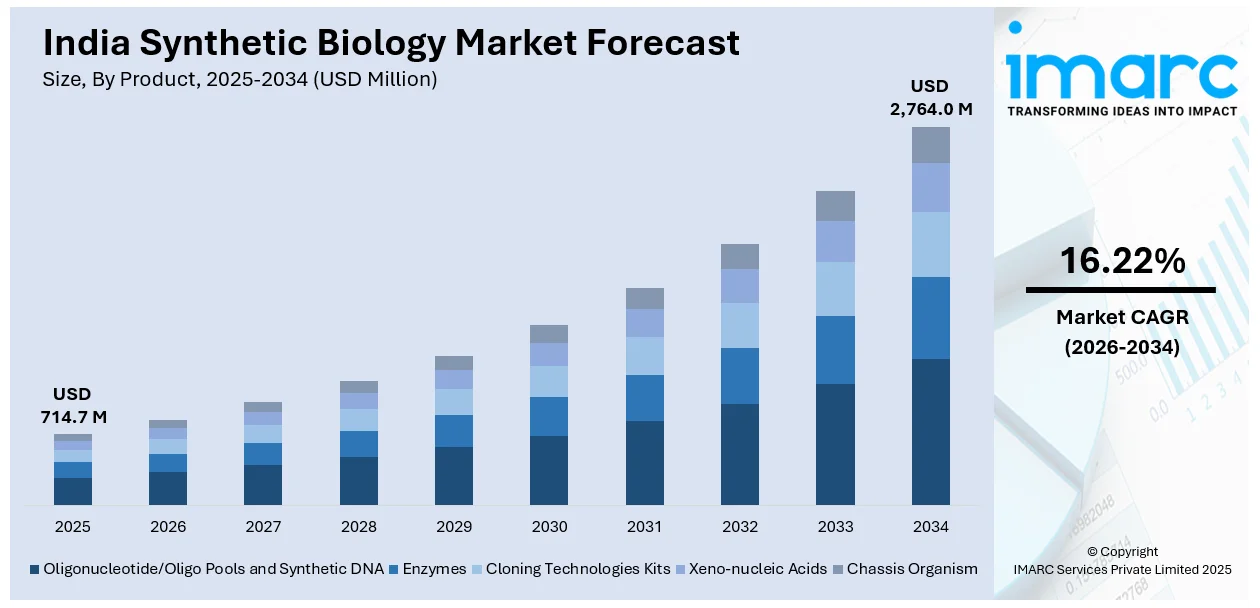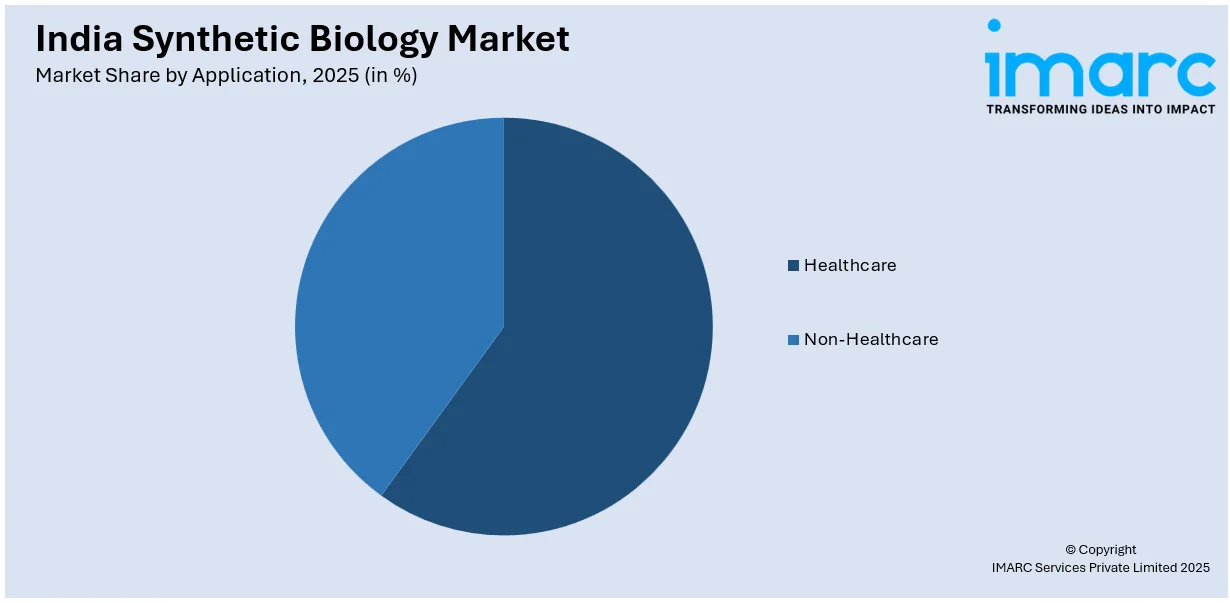
India Synthetic Biology Market Size, Share, Trends and Forecast by Product, Technology, Application, and Region, 2026-2034
Market Overview:
India synthetic biology market size reached USD 714.7 Million in 2025. Looking forward, IMARC Group expects the market to reach USD 2,764.0 Million by 2034, exhibiting a growth rate (CAGR) of 16.22% during 2026-2034. The increasing utilization of gene editing tools such as CRISPR-Cas9, which can enable more precise and efficient manipulation of genetic material, making it easier to design and engineer biological systems, is driving the market.
|
Report Attribute
|
Key Statistics
|
|---|---|
|
Base Year
|
2025 |
|
Forecast Years
|
2026-2034
|
|
Historical Years
|
2020-2025
|
| Market Size in 2025 | USD 714.7 Million |
| Market Forecast in 2034 | USD 2,764.0 Million |
| Market Growth Rate (2026-2034) | 16.22% |
Synthetic biology is a multidisciplinary field that combines principles of biology, engineering, and computer science to design and construct artificial biological systems or redesign existing ones. It involves the manipulation of genetic material, such as DNA, to create new organisms or modify existing ones for specific purposes. Scientists in synthetic biology aim to develop biological components, devices, and systems with novel functions, mirroring the way engineers design and build machines. This field holds promise for applications in medicine, agriculture, energy, and environmental management. It enables the creation of synthetic organisms that can produce biofuels, pharmaceuticals, and materials, as well as the engineering of biological circuits for programmable and responsive functions. While synthetic biology offers innovative solutions, ethical considerations, safety precautions, and careful regulation are crucial to addressing potential risks and ensuring responsible use of this rapidly advancing technology.

To get more information of this market Request Sample
India Synthetic Biology Market Trends:
The synthetic biology market in India is experiencing robust growth driven by several key factors. Firstly, advancements in DNA synthesis technologies have propelled the development of synthetic biology applications, enabling scientists to design and construct biological systems with unprecedented precision. Moreover, the decreasing costs associated with gene synthesis and editing tools have democratized access to these technologies, fostering innovation across diverse industries. Furthermore, the increasing demand for sustainable solutions has positioned synthetic biology as a pivotal player in addressing regional challenges, such as climate change and resource scarcity. The ability to engineer microorganisms for biofuel production, waste remediation, and environmentally friendly manufacturing processes has garnered attention from both researchers and industries seeking eco-friendly alternatives. In addition to this, collaborations between synthetic biology firms and traditional industries have expanded the market reach, fostering interdisciplinary approaches to problem-solving. The convergence of synthetic biology with fields like medicine, agriculture, and energy has created a fertile ground for transformative applications, amplifying the market's growth potential. Overall, the synthetic biology market in India is being propelled by a confluence of technological advancements, cost reductions, sustainability imperatives, and collaborative initiatives, setting the stage for a dynamic and innovative future in the biological engineering landscape.
India Synthetic Biology Market Segmentation:
IMARC Group provides an analysis of the key trends in each segment of the market, along with forecasts at the country level for 2026-2034. Our report has categorized the market based on product, technology, and application.
Product Insights:
- Oligonucleotide/Oligo Pools and Synthetic DNA
- Enzymes
- Cloning Technologies Kits
- Xeno-nucleic Acids
- Chassis Organism
The report has provided a detailed breakup and analysis of the market based on the product. This includes oligonucleotide/oligo pools and synthetic DNA, enzymes, cloning technologies kits, Xeno-nucleic acids, and chassis organism.
Technology Insights:
- NGS Technology
- PCR Technology
- Genome Editing Technology
- Bioprocessing Technology
- Others
A detailed breakup and analysis of the market based on the technology have also been provided in the report. This includes NGS technology, PCR technology, genome editing technology, bioprocessing technology, and others.
Application Insights:

Access the comprehensive market breakdown Request Sample
- Healthcare
- Clinical
- Non-Clinical/Research
- Non-Healthcare
- Biotech Crops
- Specialty Chemicals
- Bio-Fuels
- Others
The report has provided a detailed breakup and analysis of the market based on the application. This includes healthcare (clinical and non-clinical/research) and non-healthcare (biotech crops, specialty chemicals, bio-fuels, and others).
Regional Insights:
- North India
- West and Central India
- South India
- East and Northeast India
The report has also provided a comprehensive analysis of all the major regional markets, which include North India, West and Central India, South India, and East and Northeast India.
Competitive Landscape:
The market research report has also provided a comprehensive analysis of the competitive landscape. Competitive analysis such as market structure, key player positioning, top winning strategies, competitive dashboard, and company evaluation quadrant has been covered in the report. Also, detailed profiles of all major companies have been provided.
India Synthetic Biology Market Report Coverage:
| Report Features | Details |
|---|---|
| Base Year of the Analysis | 2025 |
| Historical Period | 2020-2025 |
| Forecast Period | 2026-2034 |
| Units | Million USD |
| Scope of the Report | Exploration of Historical Trends and Market Outlook, Industry Catalysts and Challenges, Segment-Wise Historical and Future Market Assessment:
|
| Products Covered | Oligonucleotide/Oligo Pools and Synthetic DNA, Enzymes, Cloning Technologies Kits, Xeno-nucleic Acids, Chassis Organism |
| Technologies Covered | NGS Technology, PCR Technology, Genome Editing Technology, Bioprocessing Technology, Others |
| Applications Covered |
|
| Regions Covered | North India, West and Central India, South India, East and Northeast India |
| Customization Scope | 10% Free Customization |
| Post-Sale Analyst Support | 10-12 Weeks |
| Delivery Format | PDF and Excel through Email (We can also provide the editable version of the report in PPT/Word format on special request) |
Key Benefits for Stakeholders:
- IMARC’s industry report offers a comprehensive quantitative analysis of various market segments, historical and current market trends, market forecasts, and dynamics of the India synthetic biology market from 2020-2034.
- The research report provides the latest information on the market drivers, challenges, and opportunities in the India synthetic biology market.
- Porter's five forces analysis assist stakeholders in assessing the impact of new entrants, competitive rivalry, supplier power, buyer power, and the threat of substitution. It helps stakeholders to analyze the level of competition within the India synthetic biology industry and its attractiveness.
- Competitive landscape allows stakeholders to understand their competitive environment and provides an insight into the current positions of key players in the market.
Key Questions Answered in This Report
The India synthetic biology market was valued at USD 714.7 Million in 2025.
The India synthetic biology market is projected to exhibit a CAGR of 16.22% during 2026-2034, reaching a value of USD 2,764.0 Million by 2034.
India's synthetic biology market is driven by advancements in genetic engineering, increased government support for biotechnology, a rising focus on sustainable solutions like biofuels and bioplastics, and growing interest from startups and research institutions. Collaboration between academia and industry further accelerates innovation and commercialization in this emerging field.
Need more help?
- Speak to our experienced analysts for insights on the current market scenarios.
- Include additional segments and countries to customize the report as per your requirement.
- Gain an unparalleled competitive advantage in your domain by understanding how to utilize the report and positively impacting your operations and revenue.
- For further assistance, please connect with our analysts.
 Request Customization
Request Customization
 Speak to an Analyst
Speak to an Analyst
 Request Brochure
Request Brochure
 Inquire Before Buying
Inquire Before Buying




.webp)




.webp)












